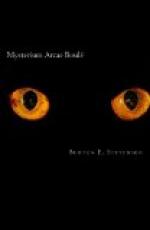And, indeed, it did. Those two tiny incisions, scarcely half an inch apart, might well have been made by a serpent’s fangs.
The quick glance which all of us cast about the room was, of course, as involuntary as the chill which ran up our spines; yet Godfrey and I—yes, and Simmonds—had the excuse that, once upon a time, we had had an encounter with a deadly snake which none of us was likely ever to forget. We all smiled a little sheepishly as we caught each other’s eyes.
“No, I don’t think it was a snake,” said Godfrey, and again bent close above the hand. “Smell it, Mr. Goldberger,” he added.
The coroner put his nose close to the hand and sniffed.
“Bitter almonds!” he said.
“Which means prussic acid,” said Godfrey, “and not snake poison.” He fell silent a moment, his eyes on the swollen hand. The rest of us stared at it too; and I suppose all the others were labouring as I was with the effort to find some thread of theory amid this chaos. “It might, of course, have been self-inflicted,” Godfrey added, quite to himself.
Goldberger sneered a little. No doubt he found the incomprehensibility of the problem rather trying to his temper.
“A man doesn’t usually commit suicide by sticking himself in the hand with a fork,” he said.
“No,” agreed Godfrey, blandly; “but I would point out that we don’t know as yet that it is a case of suicide; and I’m quite sure that, whatever it may be, it isn’t usual.”
Goldberger’s sneer deepened.
“Did any reporter for the Record ever find a case that was usual?” he queried.
It was a shrewd thrust, and one that Godfrey might well have winced under. For the Record theory was that nothing was news unless it was strange and startling, and the inevitable result was that the Record reporters endeavoured to make everything strange and startling, to play up the outre details at the expense of the rest of the story, and even, I fear, to invent such details when none existed.
Godfrey himself had been accused more than once of a too-luxuriant imagination. It was, perhaps, a realisation of this which had persuaded him, years before, to quit the detective force and take service with the Record. What might have been a weakness in the first position, was a mighty asset in the latter one, and he had won an immense success.
Please understand that I set this down in no spirit of criticism. I had known Godfrey rather intimately ever since the days when we were thrown together in solving the Holladay case, and I admired sincerely his ready wit, his quick insight, and his unshakable aplomb. He used his imagination in a way which often caused me to reflect that the police would be far more efficient if they possessed a dash of the same quality; and I had noticed that they were usually glad of his assistance, while his former connection




